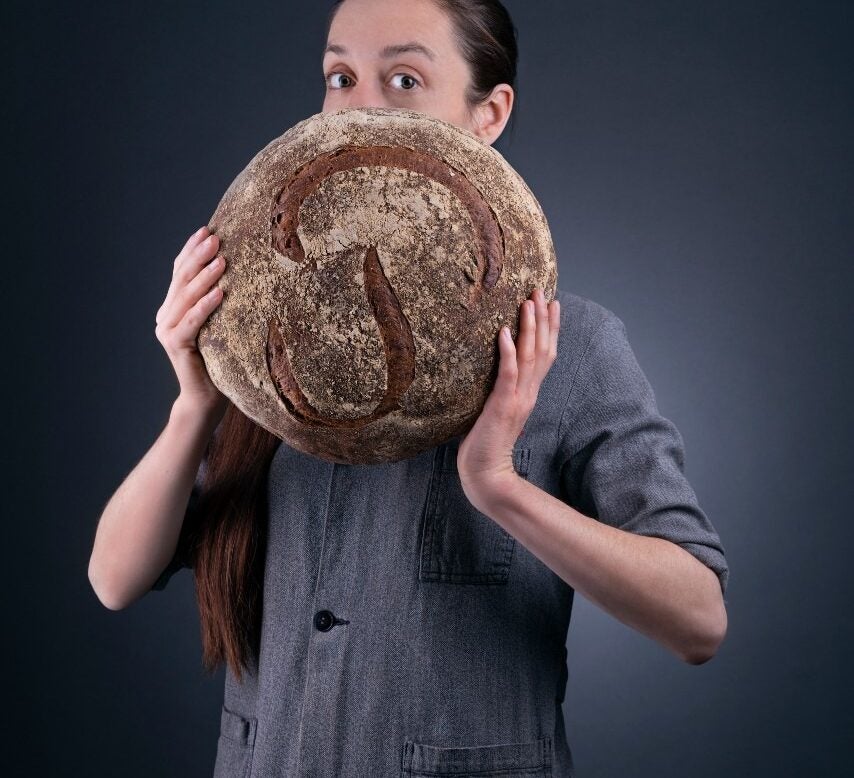
Apollonia Poilâne, scion of the world’s leading baking dynasty, wants to teach the world to bake
As a newborn, Apollonia Poilâne was cradled in a wicker breadbasket made by her father Lionel – a man who built a bedroom out of dough for Salvador Dalí and petitioned the Pope to remove gluttony from the list of cardinal sins.
When she was 16, with the encouragement of her mother Ibu, Apollonia took up an apprenticeship at the family’s famous Parisian boulangerie.
‘I was serious about taking over the bakery at some point,’ says Poilâne, now 36, speaking over the phone from Paris.
But she hadn’t planned on it happening so soon. When her parents were killed in a helicopter accident, she was just 18. Poilâne speaks English with an American accent and a pleasing crystalline tone, but her voice cracks as she remembers.
‘No one dreams of losing their parents when they’re 18 years old,’ she says. ‘No, absolutely not.’
But their knowledge and passion had already been imparted. ‘I was exposed at a young age to what would become my job. My family’s craft and understanding was linked with just about every domain of knowledge.’
Still a teenager, Poilâne resolved to complement her upbringing with skills that would help her keep the family business going. She applied to study economics at Harvard and, in her admissions essay, wrote that ‘the work of several generations is at stake’. She got in.
Today, the company that bears her family name is flourishing.
In addition to the original bakery in the swanky 6th Arrondissement, there are three others in Paris and one in London, in Belgravia.
As well as chefs – Marco Pierre White, Nigella Lawson, Tom Aikens and others – Poilâne’s fans include the likes of Kylie Minogue, Paul Smith, Philip Treacy and Robert de Niro. Each year, 200,000 orders are delivered to foodies in 20 countries, from Saudi Arabia to Japan.
In 2012 the New Yorker described Poilâne as ‘bread’s most venerable brand, the Louis Vuitton of boulangers’.
This reputation is well deserved.
Although Poilâne produces everything from croissants to rye-and-raisin bread and hazelnut-filled king cakes, its signature is the rotund miche loaf. It weighs almost a kilogram and is scored with a cursive ‘P’, but the most extraordinary thing about this bread is that it is still made with the original sourdough ‘starter’ used by Apollonia’s grandfather, Pierre.
‘It’s so cool,’ Poliâne says, ‘that when I have a piece in my hand, I know that it was started by my grandfather – in 1932.’ (Truly, the family can claim to have been into sourdough since before it was cool.)
Other than this vital constituent, the only ingredients that go into the loaves are flour, water and sea salt. When mine is delivered from the Belgravia store, it is soft and firm, but not chewy. It is crusty, but without those shards that can scour the roof of your mouth.
The texture of the dough is light and airy, but consistent. Its sourness is noticeable, but subtle. It absorbs butter perfectly.
Even though the concept of continuing a family business is no longer ‘sexy’ in France, Poilâne says she is committed to the endeavour and to prioritising ‘intention over expansion’.
Modernisation, however, is not off the table.
Poilâne has signed a deal with MasterClass, which produces premium online self-improvement videos. Her classes – teaching viewers how to make bread the Poilâne way – now sit alongside videos by Serena Williams on the perfect forehand, Martin Scorsese on filmmaking and Salman Rushdie on storytelling.
Viewers may not be able to replicate the facilities at Poilâne’s premises in Bièvres, which is fitted with two dozen 100-tonne wood-fired ovens designed to replicate her grandfather’s original 300-year-old old oven. But aside from this, they will have all they need – to this day, none of Poilâne’s bread is kneaded by machines.
The woman at its helm says she plans teach the world to bake using an underrated but ‘most sophisticated’ tool: ‘My hands.’
Web: poilane.com
Read more:
The best ‘second wines’ of the great estates
How El Bulli’s influence on food endures
Barolo: An untapped wine investment in northwestern Italy








